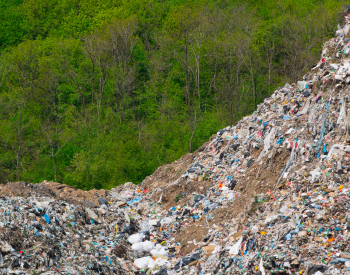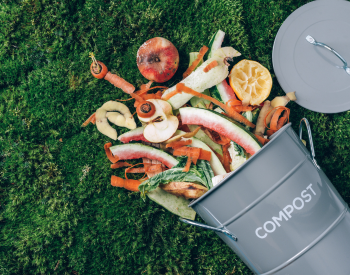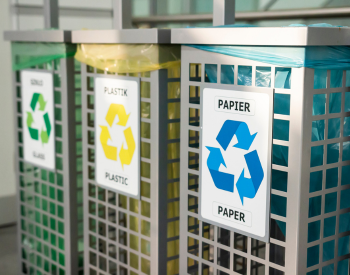Managing solid waste has become a significant global concern as companies and individuals strive to implement sustainable practices for a cleaner environment. In the foodservice industry, understanding and managing the solid waste stream plays a crucial role in reducing food waste and lowering the sector's environmental impact. This article explores the concept of the solid waste stream, its relevance in foodservice, and the methods employed by industry stakeholders to minimize waste.
Defining The Solid Waste Stream
The solid waste stream refers to the flow of discarded materials and products in various collectives, transportation, processing, recycling, and disposal stages. It encompasses a wide range of waste types, including municipal, industrial, and special categories like electronic waste (e-waste). Solid waste typically comprises food waste, packaging materials, and single-use items in the foodservice sector.
The Significance Of The Solid Waste Stream in Foodservice
The foodservice sector contributes significantly to the global solid waste stream, generating pre-consumer and post-consumer waste. Pre-consumer waste originates from unsold food items and preparation discards, while post-consumer waste refers to leftover food and used packaging from customers. These waste categories present unique challenges and opportunities for adopting waste reduction strategies.
Moreover, it is estimated that one-third of all food produced globally goes to waste, which, beyond the environmental issues, represents a significant economic loss. The consequences of this waste include increased carbon emissions, depletion of natural resources, and rising operational costs for establishments.
As the foodservice sector continues to grow, proper waste disposal and waste reduction practices become crucial to mitigating environmental impacts and conserving resources. By understanding and effectively managing the solid waste stream, restaurants, and other businesses can:
- Reduce landfill burden: Landfills contribute to greenhouse gas emissions and cause environmental degradation through land, air, and water pollution. Efficient waste reduction strategies in the foodservice sector can help minimize landfill garbage and curb related environmental damage.
- Conserve resources and energy: Reducing waste generation and promoting recycling can help conserve resources such as water, raw materials, and energy required to produce new materials and products.
- Enhance sustainability image: Adopting responsible waste management practices in the foodservice industry can improve a company’s reputation among environmentally conscious consumers and foster customer loyalty.
- Save on operational costs: Efficient waste management practices can reduce disposal fees for establishments and lead to lower food costs by minimizing waste generation.

Waste Reduction Strategies in Foodservice
To effectively minimize the solid waste stream in foodservice, businesses can adopt a range of waste reduction strategies, including the following.
Source Reduction
This approach involves reducing waste generation at its origin by modifying production, consumption, and distribution processes. Foodservice businesses can:
- Optimize inventory management to reduce food spoilage
- Implement portion control to minimize leftover food waste
- Offer incentives for customers to bring their containers or utensils
- Eliminate single-use items and replace them with reusable alternatives
- Train staff on waste reduction techniques, such as food preparation hacks that minimize waste from trimming or peeling ingredients
Recycling and Composting
Recycling involves converting waste materials into new products, while composting transforms organic waste into nutrient-rich soil amendments. Foodservice establishments can:
- Establish an on-site or off-site recycling program for materials like paper, plastic, metal, and glass.
- Partner with local farms or community gardens to repurpose food waste as animal feed or compost.
- Implement a composting system for food waste using compost bins, capable of transforming organic matter into valuable compost for landscaping or agricultural use.

Waste-to-Energy Conversion
Waste-to-energy conversion technologies, such as anaerobic digestion or incineration, can convert organic waste into biogas, heat, and electricity sources. Foodservice companies can invest in these technologies or partner with local waste-to-energy facilities to reduce landfilling and generate renewable energy from waste.
Waste Tracking and Analytics
Employing waste tracking software or mobile applications to monitor waste generation can help businesses identify areas for improvement and make data-driven decisions to streamline waste management processes. Understanding patterns of waste generation can lead to more effective waste reduction interventions.
Exploring the Impacts of Solid Waste
To comprehend the full implications of solid waste management, we must first understand the environmental burden it creates. Our collective waste contributes not only to visible, tangible land pollution but also to air and water pollution. Emitted greenhouse gases from landfills further aggravate climate change, while harmful chemicals leaking into groundwater sources endanger water quality and marine ecosystems.
The foodservice industry, in particular, bears a sizable portion of this burden and thus has a momentous opportunity to spearhead sustainable changes. Such interventions can do more than reduce harmful impacts, they can also, in parallel, generate positive influences on various aspects of their operations and consequently, on the planet.
The Economic Perspective
From an economic viewpoint, efficient waste management can be a keystroke of brilliance. By minimizing waste, businesses can not only reduce costs associated with waste disposal but also potentially save money through streamlined operations, such as optimized procurement processes and more efficient use of raw materials. Furthermore, the salvage of materials like plastic, glass, metals from waste and their appropriate recycling can lead to a significant reduction in the consumption of raw materials. By transforming the perception of waste from a liability to a resource, businesses can achieve multiple benefits at once.

A Sustainable Future
By understanding the solid waste stream and its relevance to the foodservice sector, companies can strategically implement waste reduction practices that conserve resources, protect the environment, and boost their sustainability image. Combined efforts in source reduction, recycling, composting, and waste-to-energy conversion will minimize waste generation and contribute to a circular economy and a greener future.
By embracing a holistic approach to waste management, the foodservice sector can significantly mitigate solid waste's environmental and economic repercussions. Meaningful engagement with stakeholders and ongoing cooperation will be essential to drive further progress towards a sustainable foodservice industry.






